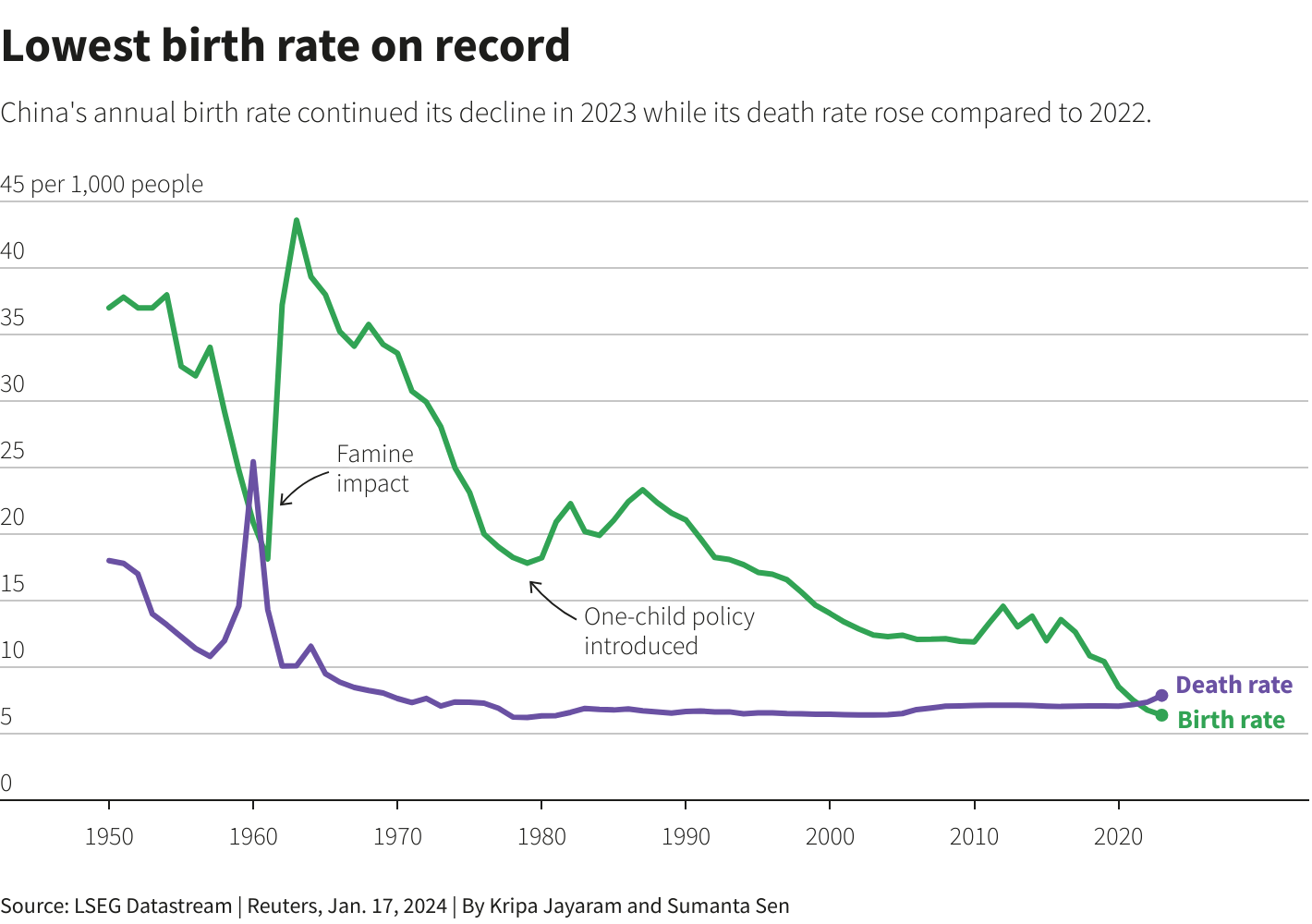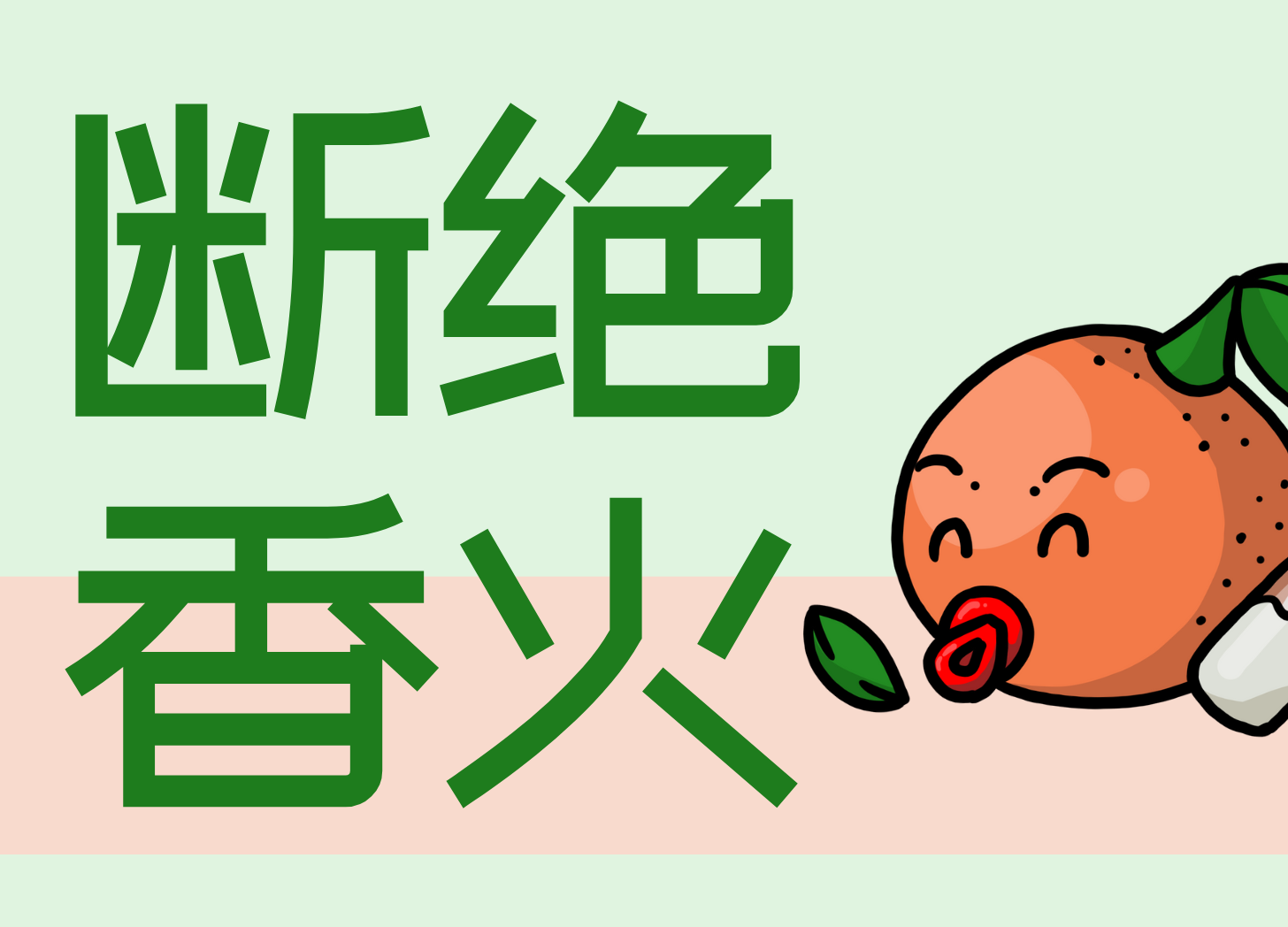China's Birth Rates Are Falling: What Changes Are Ahead?
And How Is China Trying to Tackle This Problem? 👶
Idiom of the week: 断绝香火 (duàn jué xiāng huǒ)
Meaning: "cutting off the incense line", ending of a family line
甚至部分地区已经出现了明显的负增长情况,很可能会出现“断绝香火”。Some regions have already shown a clear trend of negative growth, and it is very likely that the situation of 'cutting off the family line' will occur.
Declining birth rates are a challenge faced by many developed and developing economies, and China is no exception. In 2021, the country revised its previously strict population policy, allowing couples to have up to three children. However, the policy appears to be falling short, as China’s birth rate continues to decline year after year.
What are the reasons for Chinese population decline and how will it affect the country’s future? Let’s read about it and learn some new vocabulary related to demograhics.
数据显示,过去五年,我国的新生儿数量下降了约40%,2022年的总出生人数为956万。这一数字再次引发了对于中国人口发展走势的担忧。*
中国作为人口最多的国家之一,人口出生率的下降对整个社会和经济都有重要影响。首先,低出生率将进一步加剧人口老龄化问题,给养老保障和医疗服务等社会事业带来巨大压力。其次,出生人口的减少也会对经济发展产生负面影响,降低劳动力市场的活力,并可能导致人口红利逐渐消失。此外,人口失衡将对社会稳定和国家安全构成挑战。
数据显示 (shùjù xiǎnshì) - data shows
新生儿 (xīnshēng ér) - newborns
约 (yuē) - approximately
总出生人数 (zǒng chūshēng rénshù) - total number of births
引发 (yǐn fā) - trigger, provoke
人口发展走势 (rénkǒu fāzhǎn zǒushì) - population development trend
出生率 (chūshēng lǜ) - birth rate
加剧 (jiājù) - intensify
人口老龄化 (rénkǒu lǎolíng huà) - population aging
养老保障 (yǎnglǎo bǎozhàng) - pension security
医疗服务 (yīliáo fúwù) - medical services
社会事业 (shèhuì shìyè) - social undertakings
负面影响 (fùmiàn yǐngxiǎng) - negative impact
人口红利 (rénkǒu hónglì) - demographic dividend
失衡 (shīhéng) - imbalance
构成 (gòuchéng) - constitute, form
According to data, over the past five years, the number of newborns in China has decreased by approximately 40%. In 2022, the total number of births was 9.56 million. This figure has once again raised concerns about the trajectory of China's population development.
As one of the most populous countries in the world, the decline in birth rates in China has significant implications for society and the economy. Firstly, the low birth rate will further exacerbate the issue of population aging, placing immense pressure on social programs such as pension systems and healthcare services. Secondly, the decrease in the number of births will negatively impact economic development, reducing the dynamism of the labor market and potentially leading to the gradual disappearance of the demographic dividend. Additionally, population imbalances will pose challenges to social stability and national security.
*the article publication year is 2023

面对这一现实,专家呼吁政府采取积极措施应对出生率下降的压力。然而,我国的人口增长问题至今仍未得到妥善解决。甚至部分地区已经出现了明显的负增长情况,很可能会出现“断绝香火”。但令人困惑的是,许多中国百姓似乎对此毫不关心。
呼吁 (hūyù) - appeal, call for
积极 (jījí) - active, positive
措施 (cuòshī) - measures, steps
妥善 (tuǒshàn) - proper, appropriate
解决 (jiějué) - solve, resolve
部分地区 (bùfen dìqū) - some regions
负增长 (fù zēngzhǎng) - negative growth
断绝香火 (duànjué xiānghuǒ) - cut off the family line (figurative)
令人困惑 (lìngrén kùnhuò) - confusing, perplexing
毫不关心 (háo bù guānxīn) - completely indifferent
In light of this reality, experts are calling on the government to take proactive measures to address the pressure caused by declining birth rates. However, the issue of population growth in China has yet to be effectively resolved. In fact, some regions are already experiencing significant negative population growth, raising the possibility of "cutting off the incense line". What is perplexing, however, is that many Chinese citizens appear indifferent to this issue.
要知道,“不孝有三,无后为大”。而如今,别说靠这代年轻人延续香火了。就连让他们接受婚姻,都成了一大难题!尽管国家放开二胎政策,大肆鼓励三胎。四川还取消了生育限制,允许未婚妇女生育。可再多“骚操作”,也难以改变他们的婚育观。难道这代年轻人,就真得不渴望爱情和家庭吗?当然不是!
不孝有三,无后为大" (bù xiào yǒu sān, wú hòu wéi dà) is a traditional Chinese saying, which translates to: "Among the three forms of unfilial behavior, failing to produce offspring is the greatest."
二胎政策 (èr tāi zhèngcè) - two-child policy
大肆鼓励 (dà sì gǔlì) - vigorously encourage
三胎 (sān tāi) - three children (policy)
生育限制 (shēngyù xiànzhì) - birth restrictions
未婚妇女 (wèihūn fùnǚ) - unmarried women
再多 (zài duō) - no matter how many more
骚操作 (sāo cāozuò) - "crazy moves" (informal way of describing unusual or unexpected actions)
婚育观 (hūn yù guān) - views on marriage and childbirth
渴望 (kěwàng) - long for, desire
It’s important to remember the saying, "Among the three forms of unfilial behavior, failing to produce offspring is the greatest". Yet today, not only is it unrealistic to rely on the younger generation to continue family lines, even getting them to embrace marriage has become a major challenge!
Although the government has relaxed the two-child policy and heavily promoted having a third child—even going as far as lifting childbirth restrictions in Sichuan, allowing unmarried women to give birth—such measures have done little to alter their attitudes toward marriage and childbearing.
Does this mean that the younger generation no longer yearns for love and family? Of course not!

想象一下,今天的许多年轻人连自己的生活都过得一地鸡毛。又怎么有时间和精力谈恋爱、结婚和生孩子呢?尤其是在经历了三年的疫情之后,大家没有足够的经济条件去养育多个孩子,无法承担昂贵的生育成本和教育成本。
一地鸡毛 (yī dì jīmáo) - a chaotic situation (literally: "a place full of chicken feathers")
精力 (jīnglì) - energy, effort
谈恋爱 (tán liàn'ài) - date, fall in love
尤其是 (yóuqí shì) - especiall
承担 (chéngdān) - bear, undertake
昂贵 (ángguì) - expensive
生育成本 (shēngyù chéngběn) - childbirth cost
教育成本 (jiàoyù chéngběn) - education cost
Imagine this: many young people today are barely managing their own chaotic lives. How can they possibly find the time and energy to pursue love, marriage, and starting a family? This is especially true after experiencing three years of the pandemic, which left many without the financial stability needed to raise multiple children. They simply cannot afford the high costs of childbirth and education.
当然,抛开这些问题不谈,目前的相亲市场也非常值得我们反思。如果想要结婚生子,还得先摆脱光棍。摆脱光棍就要有房有车,而高昂的房价就是横在男女之间的拦路虎。
抛开 (pāo kāi) - set aside, disregard
相亲市场 (xiāngqīn shìchǎng) - matchmaking market
反思 (fǎnsī) - reflect, reconsider
摆脱 (bǎituō) - get rid of, break free from
光棍 (guānggùn) - bachelor, single person
高昂 (gāoáng) - high, expensive
房价 (fángjià) - housing prices
横在 (héng zài) - stand in the way, block
拦路虎 (lán lù hǔ) - obstacle, roadblock (literally: "road-blocking tiger")
Of course, setting these issues aside, the current state of the matchmaking market is also worth serious reflection. For those wanting to get married and have children, the first step is overcoming singlehood. But to do that, one often needs to have a house and a car. The soaring housing prices have become a major obstacle standing between men and women.
What are your views on this problem?
Antoine & Dorota
Referenced author: 不凡智库







It will change the country and society fundamentally. How exactly, well that's the trick..